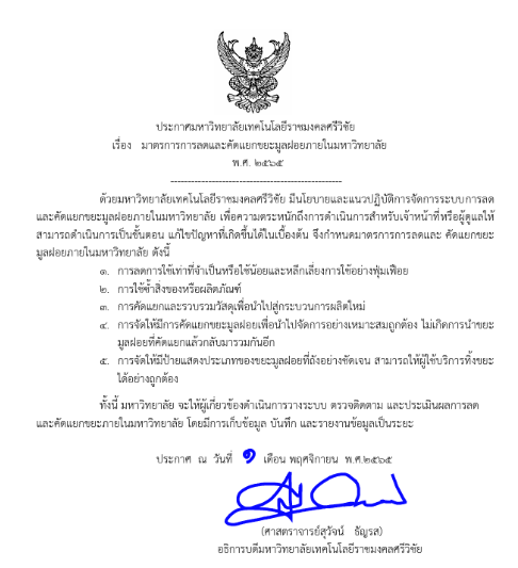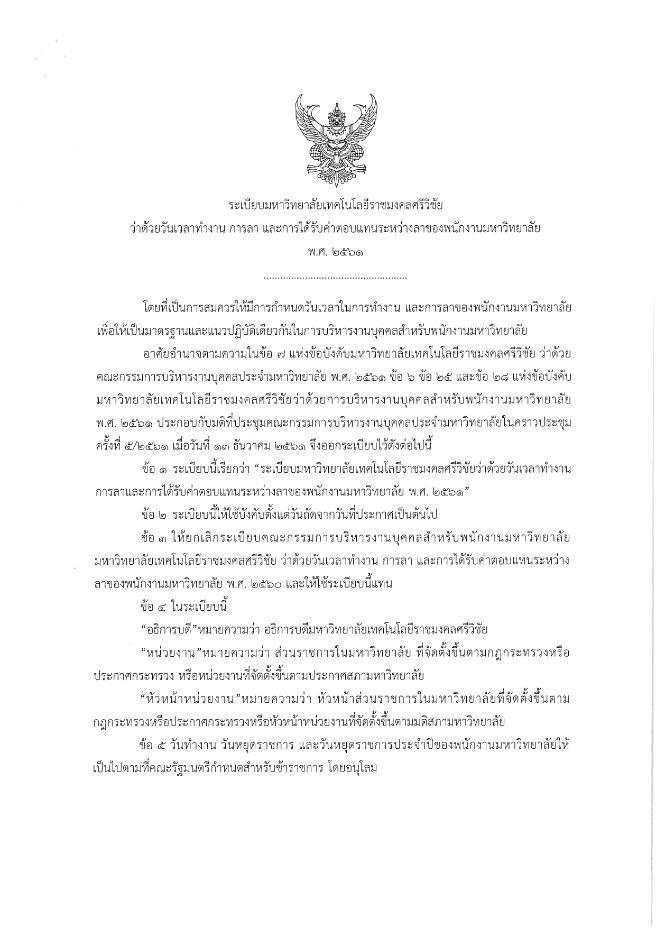Reporters :
Asst.Prof. Saowanee Chaipech
Dr. kittichon Utaynapun
Mr. Ugrit Chammari
Evidence Date: January 1, 2022 – December 31, 2022
Indicator : 12.3
Related SDGs:

University Policy Proportion of recycled waste Year: 2022
The Regional University of Thailand (RUTS) is an academic institution comprising three campuses, specifically the Songkhla, Nakhon Si Thammarat, and Trang campuses, collectively generating an average of 4,500 kilograms of waste per day. RUTS has established policies and operational guidelines for the management of an internal waste reduction and separation system within the all campuses. Consequently, the waste reduction and separation measures within the institution are defined as follows:
1. Prioritizing the reduction of consumption to necessary levels, practicing conservatism, and avoiding wasteful consumption.
2. Embracing the concept of reusing items or products.
3. Engaging in the separation and collection of materials for recycling processes.
4. Enforcing waste separation measures to facilitate appropriate and effective waste management, thereby preventing the reintegration of segregated waste.
5. Installing clear signage to designate the different types of recyclable waste in waste bins, enabling users to dispose of their waste correctly. Furthermore, the university administration has also tasked individuals with establishing a system for monitoring, tracking, and assessing the waste reduction and separation within the university, with a data collection, recording, and reporting process in place.

12.3.2.1 Amount of waste generated
RUTS generates an estimated total of 4,500 kilograms of waste per business day. The allocation of this waste is as follows: the Songkhla campus is responsible for approximately 55%, the Nakhon Si Thammarat campus contributes 33%, and the Trang campus accounts for 15%. The subsequent data provides a breakdown of waste categorization: Within the Songkhla Campus area, daily waste production averages 2,500 kilograms. The majority of this waste, equivalent to 2,125 kilograms per day or 85%, constitutes general waste (Garbage). The remaining 13% is composed of recyclable waste, including plastic and paper, with an average of 325 kilograms per day, and 2% is categorized as hazardous waste.




12.3.2.2 Amount of waste recycled
The central objective of waste management within RUTS’ organizational framework is the effective management of recyclable waste. We employ a waste separation strategy to facilitate its reintegration into the recycling process across all RUTS campuses, with a specific emphasis on the recycling of plastic bottles and paper materials. This separated waste is subsequently dispatched to recycling facilities for thorough processing. Notably, within the Nakhon Si Thammarat Campus area, approximately 500 kilograms of recyclable waste are dispatched on a monthly basis, constituting 8-10% of the total waste generated. The remaining portion is directed towards waste management procedures overseen by the municipal authorities. It is noteworthy that the waste management protocols maintain a uniform standard throughout all RUTS campuses.


12.3.2.3 Amount of waste set to landfill
The management of Garbage waste at RUTS, the predominant waste category across all campuses, involves collaborative efforts with municipal waste management authorities in their respective regions. To illustrate, within the Songkhla campus area, the Municipal Government of Songkhla City assumes responsibility for the disposal of waste into landfill processes, handling an estimated daily quantity of approximately 2,100 kilograms. In the Nakhon Si Thammarat campus area, waste management is overseen by the local sub-district municipality of Tham Yai, managing an approximate daily volume of 1,100 kilograms. Meanwhile, in the Trang campus area, the municipal authority of Sikao manages waste management, overseeing a daily volume of approximately 550 kilograms. Nevertheless, RUTS places a significant emphasis on research aimed at repurposing household waste by developing indigenous microorganisms to break down and transform kitchen waste into organic fertilizer. Successful implementation of this research endeavor would potentially lead to a reduction in the volume of kitchen waste disposed of in landfills.
Related Links:
https://statute.rmutsv.ac.th/file/126658.pdf



